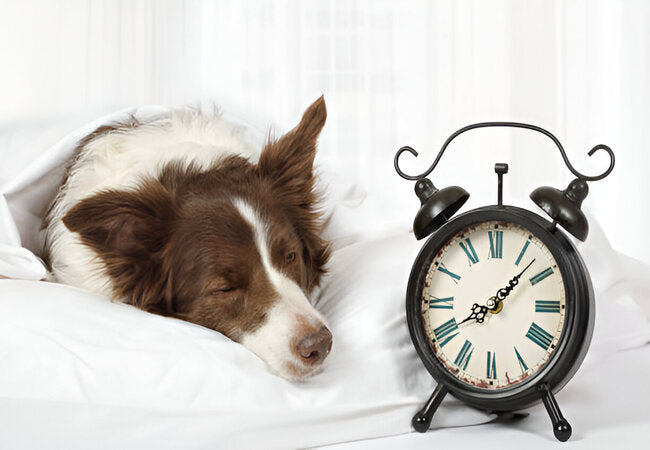2025 Vet Guide: How Many Hours Does My Dog Sleep a Day? Sleep Needs & Wellness 🐶💤

In this article
2025 Vet Guide: How Many Hours Does My Dog Sleep a Day? Sleep Needs & Wellness 🐶💤
By Dr. Duncan Houston BVSc
Hi—I'm Dr Duncan Houston BVSc, veterinarian and Ask A Vet founder. Dogs sleep a lot—but how much exactly is normal, and when should you worry? In 2025, with more pet parents noticing their pups napping all day, it's crucial to understand canine sleep patterns across life stages and health statuses. This guide dives into typical sleep hours, influencing factors, tips for healthy routines, and watch‑out signs requiring vet attention. Let’s help your dog rest well and live well. 🧠❤️
1. Average Sleep Across Life Stages
1.1 Puppies (under 1 year)
Puppies may sleep 18–20 hours daily, including long nights and multiple daytime naps—important for growth, brain development, immune function, and energy balance.
1.2 Adult Dogs (1–7 years)
Adult dogs typically sleep 10–14 hours/day. That includes ~6–8 hours overnight, plus short naps totalling 4–6 hours during the day.
1.3 Senior Dogs (7+ years)
Senior dogs often return to sleeping 18–20 hours/day, resting more due to lower energy, joint discomfort, and cognitive changes.
2. Factors That Affect Sleep Duration
- Breed & size: Larger breeds tend to sleep more than small ones; greyhounds, mastiffs may hit higher sleep averages.
- Age: Energy demands change across life—puppies and seniors sleep most.
- Activity level: Physically active dogs may sleep more to recover; bored dogs may nap out of inactivity.
- Environment: Quiet, comfortable, safety—dogs sleep best when relaxed; overstimulation shortens rest time.
- Health & pain: Chronic pain, illness, arthritis, and endocrine issues affect sleep quality and duration.
- Routine: Consistent routines—walks, play, rest—help regulate healthy sleep rhythms.
3. Why Dogs Sleep So Much
- Energy conservation: As carnivores, dogs evolved to rest when not hunting.
- Polyphasic sleep patterns: Dogs sleep in short bursts—unlike humans, they nap often throughout the day and night.
- REM and dreaming: Like people, dogs cycle through REM sleep and often dream—sometimes twitching, barking softly, or moving paws.
4. Healthy Sleep vs Concerning Fatigue
4.1 What’s Normal
- Average adult sleep: 10–14 hrs/day.
- Puppies/seniors: 15–20 hrs/day.
- Nap patterns: frequent short sessions.
- Alertness when awake, eagerness to play/exercise.
4.2 Red Flags
- Sudden increase >15 hrs without reason.
- Sleepy during activities, slow to wake, little interest in play.
- Pauses, limp, panting, confusion—possible pain or illness.
- Frequent waking, pacing, whining could be anxiety or discomfort.
- Disturbed sleep by coughing, frequent urination, and heavy breathing could indicate medical problems.
5. Tips to Support Better Dog Sleep
- Create a cozy sleep space: Soft bed, safe environment, low noise/light.
- Enforce a routine: Schedule walks, meals, play, and sleep times consistently.
- Provide enrichment: Mental toys (Woopf), chews, puzzle feeders to reduce naps from boredom.
- Ensure adequate exercise: Tailor activity to age and breed.
- Monitor health: Regular vet checks, pain management, and treat underlying issues.
- Soothing tools: Purrz pheromones, calming music during rest periods.
6. When to Call the Vet
- Consistent sleep >15 hrs/day in adults without lifestyle change.
- Sleep disruptions with panting, coughing, urination—possible heart/kidney issues.
- Lethargy, weakness, loss of appetite accompany fatigue.
- Senior disorientation or cognitive decline—rest affects mental health.
- Dogs showing aggression or mood shifts from lack of sleep.
7. FAQs on Dog Sleep ❓
- Q: My adult dog sleeps 14 hrs—is that too much?
- A: Not necessarily—14 hrs is within normal range. Still, watch for energy levels and signs of pain or depression.
- Q: Puppies sleep 20 hrs—is that okay?
- A: Yes—growth stages need lots of rest. Just ensure they wake for potty, nutrition, and safe interaction.
- Q: My dog snores—safe?
- Some snoring is normal. Loud, heavy breathing may hint at airway issues—mention it to your vet.
- Q: Should I wake my dog?
- Generally no—interrupting REM sleep can cause confusion or startled reactions.
8. Ask A Vet Tools & Advice 🛠️
The Ask A Vet app helps you:
- Track sleep patterns and log changes
- Upload videos showing nighttime rest or lethargy
- Get customized sleep and activity plans
- Access calming aids (Purrz) and mental enrichment (Woopf)
- Consult vets or behaviorists remotely
🩺 Final Vet Insight
Dogs do spend much of their day asleep, but sleep supports their growth, recovery, and well-being. By recognizing normal patterns, creating a supportive routine and environment, and acting when warning signs appear, you can help your dog thrive. And whenever sleep seems off, Ask A Vet is ready to guide you toward restful nights and happy days. ❤️🐾






